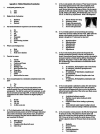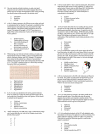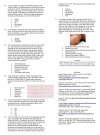Medical Simulation-Based Learning Outcomes in Pre-Clinical Medical Education
- PMID: 33415028
- PMCID: PMC7781771
- DOI: 10.7759/cureus.11875
Medical Simulation-Based Learning Outcomes in Pre-Clinical Medical Education
Abstract
Introduction Medical simulation is widely used in the United States medical curriculum. However, learning outcomes based on simulation have yet to be reported. In this study, we aim to characterize the objective performance of first- and second-year medical students following eight weeks of medical simulation-based learning. Methods First- (n=25) and second-year (n=15) medical students were recruited for this study. We designed and administered a novel pre-experience examination to collect participant demography and assess simulation and non-simulation knowledge. Following 14 high-fidelity simulation scenarios over the course of eight weeks, we administered an identical post-experience examination and compared performance, primarily using a within-subjects analytic design. Results Student performance improved by an average of 18% following the medical simulation experience, and first-year students demonstrated greater benefit (22%) as compared to second-years (12%). Relative to first-years, second-year students showed higher overall performance on both pre- and post-examination. Demographic factors and prior medical experience were not significantly associated with assessment performance and score improvement. Conclusions Our data supported the efficacy of simulation-based learning as evidenced by the significant improvement in objective performance on a standardized examination. That is, both first- and second-year medical students demonstrated test-score improvement following an eight-week medical simulation program. Of note, the first-year students exhibited greater benefit (at the group level). Importantly, these findings were statistically unrelated to participant demographic and background variables. Collectively, this study provides preliminary evidence that medical simulation in the pre-clinical phase of undergraduate medical education is an effective tool for student learning.
Keywords: clinical; comlex; emergency medicine; medical education; pre-clinical; undergraduate; usmle.
Copyright © 2020, Jabaay et al.
Conflict of interest statement
The authors have declared that no competing interests exist.
Figures
Similar articles
-
Student and educator experiences of maternal-child simulation-based learning: a systematic review of qualitative evidence protocol.JBI Database System Rev Implement Rep. 2015 Jan;13(1):14-26. doi: 10.11124/jbisrir-2015-1694. JBI Database System Rev Implement Rep. 2015. PMID: 26447004
-
Effectiveness of high fidelity simulation versus low fidelity simulation on practical/clinical skill development in pre-registration physiotherapy students: a systematic review.JBI Database System Rev Implement Rep. 2019 Jun;17(6):1229-1255. doi: 10.11124/JBISRIR-2017-003931. JBI Database System Rev Implement Rep. 2019. PMID: 30964770
-
One week with the experts: a short course improves musculoskeletal undergraduate medical education.J Bone Joint Surg Am. 2014 Mar 5;96(5):e39. doi: 10.2106/JBJS.M.00325. J Bone Joint Surg Am. 2014. PMID: 24599211
-
Introducing early-phase medical students to clinical paediatrics using simulation and a flipped-classroom.J Paediatr Child Health. 2019 Sep;55(9):1107-1112. doi: 10.1111/jpc.14366. Epub 2019 Jan 22. J Paediatr Child Health. 2019. PMID: 30672066
-
INTRODUCTION OF SIMULATION BASED MEDICAL EDUCATION AT ADDIS ABABA UNIVERSITY COLLEGE OF HEALTH SCIENCES: EXPERIENCE AND CHALLENGE.Ethiop Med J. 2015 Jul;Suppl 2:1-8. Ethiop Med J. 2015. PMID: 26591277
Cited by
-
Assessment of the effectiveness and perception of different teaching techniques used in pharmacology among students.J Postgrad Med. 2024 Oct 1;70(4):217-222. doi: 10.4103/jpgm.jpgm_44_24. Epub 2024 Dec 13. J Postgrad Med. 2024. PMID: 39670320 Free PMC article. Review.
-
Impact of a Preclinical Elective on Medical Student Performance on an Anesthesiology Simulation Scenario.Adv Med Educ Pract. 2025 Jul 19;16:1229-1238. doi: 10.2147/AMEP.S516942. eCollection 2025. Adv Med Educ Pract. 2025. PMID: 40708762 Free PMC article.
-
Investigating the impact of virtual simulation experiment and massive open online course (MOOC) on medical students' wound debridement training: a quasi-experimental study.BMC Med Educ. 2024 Sep 18;24(1):1023. doi: 10.1186/s12909-024-05991-1. BMC Med Educ. 2024. PMID: 39294595 Free PMC article.
-
Virtual Simulation in Undergraduate Medical Education: A Scoping Review of Recent Practice.Front Med (Lausanne). 2022 Mar 30;9:855403. doi: 10.3389/fmed.2022.855403. eCollection 2022. Front Med (Lausanne). 2022. PMID: 35433717 Free PMC article.
-
The effectiveness of simulation-based education combined with peer-assisted learning on clinical performance of first-year medical residents: a case-control study.BMC Med Educ. 2023 Nov 12;23(1):859. doi: 10.1186/s12909-023-04798-w. BMC Med Educ. 2023. PMID: 37953233 Free PMC article.
References
-
- Simulation in medical education. Khan K, Pattison T, Sherwood M. Med Teach. 2011;33:1–3. - PubMed
-
- Simulation in healthcare education: a best evidence practical guide. AMEE Guide No. 82. Motola I, Devine LA, Chung HS, Sullivan JE, Issenberg SB. Med Teach. 2013;35:1511–1530. - PubMed
-
- Role of in-situ simulation for training in healthcare: opportunities and challenges. Kurup V, Matei V, Ray J. Curr Opin Anaesthesiol. 2017;30:755–760. - PubMed
LinkOut - more resources
Full Text Sources
Medical



